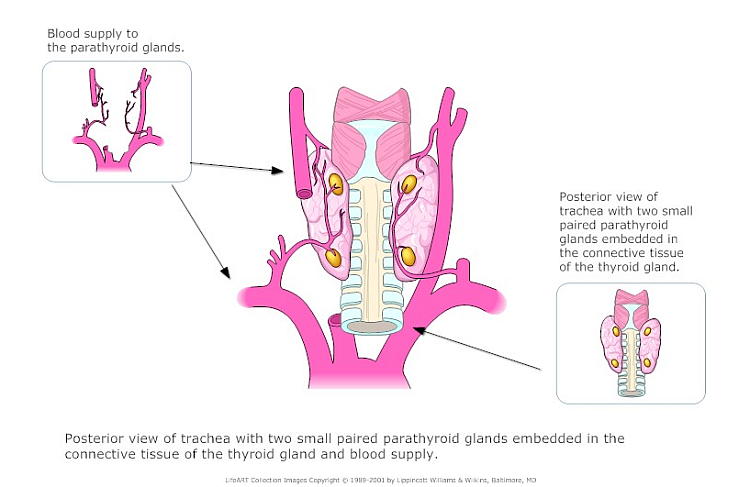The thyroid gland, located at the front of your neck, is responsible for maintaining adequate metabolism by releasing appropriate amounts of a number of hormones. An overactive thyroid causes your metabolism to increase, which in turn causes heightened anxiety, unexpected weight loss and can also cause high blood pressure. On the other hand, an underactive thyroid can increase metabolism and cause weight gain, lethargy, depression and may experience high blood pressure. However, what about when your parathyroid glands are malfunctioning? What are the parathyroid glands, anyway? What do they do?
About the parathyroid glands
The parathyroid glands are small endocrine glands in the neck of humans that produce parathyroid hormone. We usually have four parathyroid glands, variably located on the back of the thyroid gland, although considerable variation exists. Through production and regulation of parathyroid hormone, the parathyroid glands govern how much calcium you have in your bloodstream and in your calcium-dependent tissues. Hyperparathyroidism refers to the over production of parathyroid hormones, whereas hypoparathyroidism refers to a condition in which your parathyroid glands are not producing enough parathyroid hormone.
Picture showing the parathyroid glands

So, should you be worried about your parathyroid gland? How can you tell if it’s malfunctioning?
Hyperparathyroidism symptoms
Symptoms of an over active parathyroid glands include, but are not limited to:
- Lethargy and chronic fatigue; difficulty waking up no matter how much rest you have had
- Depression
- Pain in the bones – specifically in the legs and arms
- Trouble getting to sleep or waking up in the middle of the night
- Acid reflux and heartburn
- Low libido
- Loss of hair
- Kidney stones
- Rapid heart rate or arrhythmia
- Memory problems
Hyperparathyroidism is linked with high blood pressure and increased risk for heart disease. It is important to be checked by your doctor if you have experienced any of these symptoms. Hyperparathyroidism patients also often find it difficult to describe symptoms of “just not feeling right” or “feeling old”.
Hypoparathyroidism Symptoms
Hypoparathyroidism is rarer than hyperparathyroidism, but no less critical. In this case, your parathyroid glanda are not producing the hormones necessary to produce calcium in the bloodstream. This can lead to consequences associated with a lack of calcium. Symptoms include, but are not limited to:
- Muscle cramping
- Pelvic or abdominal pain
- Puffiness or pain in the face, feet, and legs
- Tingling lips and extremities
- Brittle and broken nails
- Dry, ashy skin
- Muscle spasms
- Loss of teeth
If you have had any of these symptoms, it is important you seek medical advice from your doctor as soon as possible.
Treatments
Treatment for hypoparathyroidism could be as simple as an increase in vitamin D and calcium dosages, taken in supplement form. This will provide you with adequate amounts of calcium.
Treating hyperparathyroidism, like hyperthyroidism, usually involves surgery. One or more of the parathyroid glands may be surgically removed. If the remaining parathyroid glands function at a normal level, no other treatment is necessary.
If you have questions or concerns about the parathyroid glands contact your local doctor, who will arrange for you to see a thyroid surgeon.

